Search results for "witesman"
Elmo’s fire
30 June 2008 | Archives online, Fiction, Prose
Extracts from the novel Elmo (WSOY, 1978)
After returning to Finland and Kainalniemi, Elmo got to feel like a celebrity. The various sport clubs were insufferably keen on getting Elmo into their training rings, but Elmo rebuffed them. He had belonged to Kainalniemi Sweat since he was a little boy, and that was enough for him. His mind was occupied by other matters. In the end, even his mother and father began to wonder at his attitude.
‘Why don’t you just go, since they keep asking, and since you do seem to have some talent in that direction,’ his mother urged as she made Sunday coffee from the can Elmo had brought as a gift.
‘Right. Somewhere down the road you could snatch a few gold medals out from under the noses of the others, just for the hell of it,’ his father said. More…
I hate your Face(book)
5 May 2009 | Columns, Tales of a journalist

Illustration: Joonas Väänänen
Just how ‘free’ is free speech? Pay a visit to any internet chatroom, and you’ll see. In the first column of a new series called ‘Journalist’s tales’, the media critic Jyrki Lehtola investigates intolerance on the internet
First there was utopia. Then came people, and utopia suffered.
As with all new inventions, from electricity to the atom bomb, internet social networks were supposed to make our lives better. They were supposed to give us license to network, to participate, to get to know each other, to get reacquainted, to flirt, to find an extramarital lover and to be connected to as many people as possible in as many inconsequential ways as possible. More…
Mind the gaffe
14 December 2012 | Non-fiction, Tales of a journalist
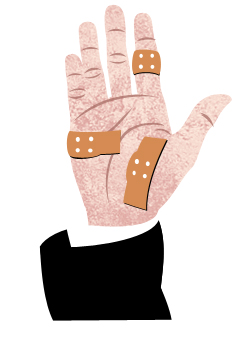
Illustration: Joonas Väänänen
Celebrating Finnish Independence Day is a serious business involving lots of handshakes and plenty of pitfalls for the unwary, observes columnist Jyrki Lehtola. But luckily there’s plenty of fun to be had for ordinary Finns in complaining about it all
When Finland makes the news, it’s usually because of a national tragedy or something odd we do. The latter ripe fodder for filling the blank pages of the international media on slow news days includes such things as the Finnish penchant for competitions in such sporting events as Wellington boot /mobile phone tossing (saappaan- / kännykänheitto) and wife carrying (akankanto).
We have another odd national tradition, although it has never received as much international recognition as the fact that we carry our wives competitively. This time- honoured custom repeats annually on the sixth of December, when we close our shops and barricade ourselves gloomily within our homes. Its name is Independence Day. More…
Pleased to see me?
16 July 2009 | Columns, Tales of a journalist
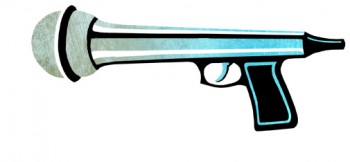
Illustration: Joonas Väänänen
When the Finnish media developed a crush on the country’s foreign minister, writes Jyrki Lehtola, no one could foresee the consequences. Especially if the object of their affections might begin to believe what they say about him…
It is a generally accepted truth that the spiteful media only raise people up in order to cast them down again a moment later.
Generally accepted truths are often not the case, although the media’s amorous relationships are, as a general rule, of short duration. More…
No place to go
30 March 2008 | Archives online, Fiction, Prose
Extracts from the novel Lakanasiivet (‘Linen wings’, Otava, 2007)
The clothesline swayed in the wind. Helvi closed her eyes and felt herself flutter into the air with the laundry. She flapped her white linen wings, straining higher, now seeing below the whole small peninsula city, its damp rooftops glittering in the morning sun, the blue sighs of the chimneys, the steamboats toiling on the lake and the trains chugging on their tracks. The whole of heaven was clear and blue; only far off in the east were there white pillars roiling – whether smoke or clouds, Helvi could not tell.
She flew north on her linen wings and saw the great bridges leading to the city, on whose flanks the hidden anti-aircraft batteries gasped the fumes of gun oil and iron, and continued her journey over the land, following the straight lines of the telephone wires. She flew over wooded hills and deep green fields, finally arriving on the slope of the great hill where her daughter now lived, in hiding from the war. More…
What about me?
30 September 2008 | Fiction, Prose
Extracts from the novel Mitä onni on (‘What happiness is’, Otava, 2008)
I was lying on the sofa watching Sports Roundup. The ski jumpers were flying at Zakopane. When I go one day, I want the cantor to play the Sports Roundup theme on the harmonium and the pallbearers to look on like skiing judges down into the pit.
‘I have an idea,’ Liisa said, sitting down at the other end of the sofa. I muted the television and adopted a focused expression. I focused on thinking about my expression.
‘Finnish happiness,’ Liisa pronounced solemnly. ‘I’ll illustrate, and you write.’
‘A book again,’ I said and turned the sound back on. They were reading off the women’s basketball scores now. Liisa waited patiently. I was disarmed enough by this that I turned the television off. More…
Too beautiful
2 July 2009 | Extracts, Non-fiction
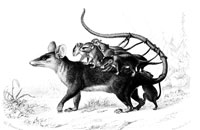
Illustration: The Universal Dictionary of Natural History (Paris, 1849)
Extracts from the collection of essays Kutistuva turska ja muita evoluution ihmeitä (‘The shrinking cod and other evolutionary marvels’) by Hanna Kokko & Katja Bargum
Who cannot but stand in awe of the genius of various parasites’ nervous system manipulations or of how beautifully the orchid ensures its pollination? The astonishingly precise adaptations of organisms are the starting point for the idea of Intelligent Design. According to Intelligent Design, such adaptations are too perfect to be products of evolution – rather, they reveal the actions of an intelligent designer. It’s a fascinating idea, write Hanna Kokko and Katja Bargum – but is it science? More…
Grown-up talk
13 June 2013 | Non-fiction, Tales of a journalist

Illustration: Joonas Väänänen
Would you say this to someone face to face? No? But anonymously, in writing, you do. Columnist Jyrki Lehtola takes a look at the way Finns tend to behave on the Internet
Babies. They’re cute. They have to be – they are babies after all. And their parents are lovely people, because they have those cute babies. Even they have a hard time believing how mellow and happy they are now that they have a baby.
But what happens to parents when the baby falls asleep and they get to creep off to the Internet? They completely freak out and turn into belligerent trolls. More…
Hatefully yours
23 December 2011 | Non-fiction, Tales of a journalist
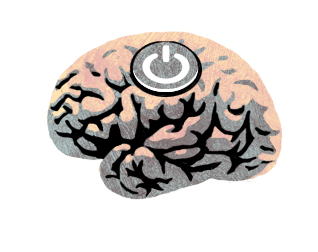
Illustration: Joonas Väänänen
In the new media it’s easy for our pet hatreds to be introduced to anyone who is interested. And of course everyone is interested, how else could it be? Jyrki Lehtola investigates
Twitter, Facebook, Twitter, Twitter, Twitter, Facebook, Twitter, how can we get the revenue model to work by using our old media, Twitter, Facebook, Twitter, Twitter, hey, what about that revenue model of ours, Twitter.
The preceding is a poignant summary of what the Finnish media was like in 2011 when the rules of the game changed like they have changed every year. And we still don’t even fully understand what the game is supposed to be. More…
Marginal notes
4 June 2009 | Essays, Non-fiction
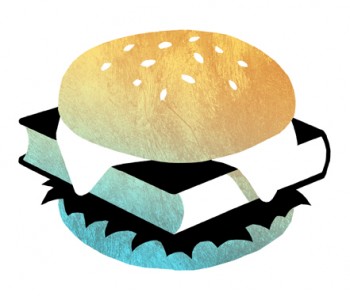
Fast food for thought? Culture meets business. – Illustration: Joonas Väänänen
Extracts from a collection of writings, Ulkona (‘Outside’, Siltala, 2008)
Literature – and ‘serious’ writing in particular, the kinds of texts we publish in Books from Finland – is often seen as lost, irrelevant, pushed out to the edge of mainstream popular culture. But, argues Hannu Raittila, the margin is actually the area of greatest freedom. Everything worthwhile happens there – and business would do well to imitate art, rather than the other way round
It is easy to see culture as a marginal part of society, if viewed from an economic perspective. It is easy to see literature, for its part, as a marginal phenomenon even when compared with other areas of culture – pop music, for example. More…
Do you remember the yellow house?
14 February 2011 | Fiction, Prose
Extracts from the novel Enkelten kirja (‘The book of angels’, Tammi, 2010)
[Tallinn, summer] The past will not go away
and the present is insurmountable. Summer vacation has begun, the newspaper hasn’t come; it doesn’t get delivered here anyway. Can you remember the Isabelline yellow house? Remember the alley with the name that means hurry? Surely you remember the home with all the maps on the shelves, the important papers and the brass objects bought from nearby antique dealers? Also the rugs from North Africa and the obligatory cedar camel figurines on the windowsill. And so many glasses and plates and empty lighters in a cardboard box on the shelf on the left hand side of the kitchen.
Tallinn, June 7th. The floors creak. One step has split in half; some of the lights have burned out. This is a lovely home. A small window upstairs is ajar to the courtyard. Tuomas had latched it behind the Virginia creepers. The fountain in the courtyard is dry. On cold nights the smoke from the fireplace grows like a statue for the crows until it wraps around over the layered rooftops like a snake eating its tail. Russian men are repairing the attic of the house across the street for wealthy people to live in; they laugh in front of the window and smoke. Tuomas waves at them, and they wave back. The courtyard is creepy when it’s empty. Soon the neighbours would go about their day and quietly close their doors behind them, and two nearby churches would divide the hours into quarters, Russians and their gossip would make their way to the Alexander Nevski Cathedral, and the Estonians and their gossip would go to their own churches where a wise and peculiar, almost human scent would rise from between the headstones. Tuomas wouldn’t smell it, Aino would and would move to stand beneath the the center tower. More…
My friend Erik Hansen
Short prose from Muita hyviä ominaisuuksia (‘Other good characteristics’, Otava, 2010)
On the first day we played getting-to-know-you games. On the second day we played real Finnish baseball out behind the university. On the third day we travelled to the countryside. Classes started sometime at the end of the second week. We watched the movie One Flew Over the Cuckoo’s Nest. The professor slurped Coke, chain smoked, and rewound the video back and forth: Nurse Ratched’s plump face filled the screen and then in the next image where her face had been there was a basketball Jack Nicholson was squeezing.
It was the autumn of 1992, and I was studying film and communications theory in Copenhagen.
The excursion to the country frightened me, a shy bacteriophobic neurotic. The Danes thought the camping centre’s shared mattresses and group cooking were hygge – cozy. There is no way a dictionary translation could ever cover all the forms of cosiness the Danes achieve together. I fled the camping centre on the first morning. On the train to Copenhagen I recognised all the usual post-escape feelings: shame, fear, guilt, loneliness and overwhelming euphoria. More…
Night decorator
31 March 2007 | Archives online, Fiction, Prose
A short story from the collection Yönseutuun (‘Around nighttime’, WSOY, 2006). Introduction by Jani Saxell
Hardly a night went by.
I didn’t want to offend him in any way by my indifference, but as I went to bed I was totally beat, squeezed dry by my day. My most important chore at home was to guard my own rest; people’s survival depended on it being consistent and nourishing. I didn’t concentrate on anything else in my free time.
But often when I was ready for bed, a sharp metal ‘zzzip’ would come from the direction of the living room. A little later I would hear a drawn-out ‘clllack!’, which told me the measuring tape had retracted into its case, the newest interior design had taken shape on the back of some receipt, and Y would soon be coming to see if I was awake and open to suggestions. More…
